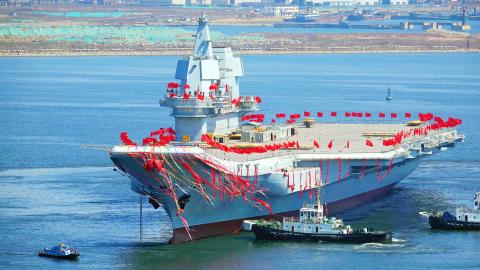The launch of China’s first domestically built aircraft carrier on Wednesday has prompted yet another flurry of review of viable Taiwanese counters, with the Ministry of National Defense (MND), legislators and academics all agreeing that missile range development and submarines should be sufficient to counter latent threats posed by the 001A carrier.
The 001A, the official name of which is yet unknown, shows that Beijing’s efforts to build a blue water navy are an unstoppable trend, and that China seeks to protect its national interests in the South China Sea, officials said on Wednesday.
However, MND officials said that, should it prove necessary, the Taiwanese navy is capable of ensuring the safety of the nation through the “layered defense” provided by Hsiung Feng III anti-ship missiles and the submarine fleet.

Photo: AFP
The comment on submarines refers to the navy’s plans to manufacture its own submarines, with the first batch scheduled to be in service after 2025.
According to Democratic Progressive Party Legislator Tsai Shih-ying (蔡適應), the reverse-engineering of the 001A from the Liaoning proves that the Chinese are now capable of manufacturing carriers.
With ample funding to sustain and maintain a carrier battle group, even if Chinese carriers were behind those of the US by one to two generations, they would still be able to delay US military aid coming to Taiwan, Tsai said.
However, Chieh Chung (揭仲), a research fellow at the National Policy Foundation, a Chinese Nationalist Party (KMT) think tank, said that while the launch of the 001A carrier shows that China’s shipbuilding technology has improved, the ship’s combat capabilities might not yet be better than those of the Liaoning.
Although the 001A has superior hardware, equipment and deck size compared to the Liaoning, it still employs a ski-jump takeoff ramp, not catapult launchers, to launch jets, which limits the ship to anti-air duty within the battle group, Chieh said.
Airborne early warning and control, and anti-submarine functions would still be performed by helicopters, Chieh said.
Meanwhile, Tsai said that the nation’s missile arsenal was made up mostly of short to mid-range defensive missiles, and the MND should not focus on acquiring more defensive weaponry in future purchases and research.
Taiwan must also acquire weaponry that is capable of offensive actions, Tsai said.
The Chung Shan Institute of Science and Technology could build on the Hsing Feng III missiles and research long-range missiles —with a range that exceeds 1,000km — that are capable of precision strikes, he said.
Only through such weaponry would Taiwan be able to present an effective deterrent to China and prevent it from resorting to armed invasion, he added.
The Chinese aircraft carrier program is still in its infancy, National Chung Hsing University Graduate Institute of International Politics professor Tsai Ming-yen (蔡明彥) said. adding that its capability to conduct strikes are as yet not fully developed, while the ship is still vulnerable to anti-submarines and anti-missile defenses.
The nation should focus on its missile development and on its project to domestically build submarines, as well as develop missile-boat platforms, Tsai Ming-yen said.
The nation should especially invest in enhancing the precision strike capabilities and increasing the destructive force of its missiles, he added.

US climber Alex Honnold is to attempt to scale Taipei 101 without a rope and harness in a live Netflix special on Jan. 24, the streaming platform announced on Wednesday. Accounting for the time difference, the two-hour broadcast of Honnold’s climb, called Skyscraper Live, is to air on Jan. 23 in the US, Netflix said in a statement. Honnold, 40, was the first person ever to free solo climb the 900m El Capitan rock formation in Yosemite National Park — a feat that was recorded and later made into the 2018 documentary film Free Solo. Netflix previewed Skyscraper Live in October, after videos

NUMBERS IMBALANCE: More than 4 million Taiwanese have visited China this year, while only about half a million Chinese have visited here Beijing has yet to respond to Taiwan’s requests for negotiation over matters related to the recovery of cross-strait tourism, the Tourism Administration said yesterday. Taiwan’s tourism authority issued the statement after Chinese-language daily the China Times reported yesterday that the government’s policy of banning group tours to China does not stop Taiwanese from visiting the country. As of October, more than 4.2 million had traveled to China this year, exceeding last year. Beijing estimated the number of Taiwanese tourists in China could reach 4.5 million this year. By contrast, only 500,000 Chinese tourists are expected in Taiwan, the report said. The report

Temperatures are forecast to drop steadily as a continental cold air mass moves across Taiwan, with some areas also likely to see heavy rainfall, the Central Weather Administration (CWA) said. From today through early tomorrow, a cold air mass would keep temperatures low across central and northern Taiwan, and the eastern half of Taiwan proper, with isolated brief showers forecast along Keelung’s north coast, Taipei and New Taipei City’s mountainous areas and eastern Taiwan, it said. Lows of 11°C to 15°C are forecast in central and northern Taiwan, Yilan County, and the outlying Kinmen and Lienchiang (Matsu) counties, and 14°C to 17°C

STEERING FAILURE: The first boat of its class is experiencing teething issues as it readies for acceptance by the navy, according to a recent story about rudder failure The Hai Kun (海鯤), the nation’s first locally built submarine, allegedly suffered a total failure of stern hydraulic systems during the second round of sea acceptance trials on June 26, and sailors were forced to manually operate the X-rudder to turn the submarine and return to port, news Web site Mirror Daily reported yesterday. The report said that tugboats following the Hai Kun assisted the submarine in avoiding collisions with other ships due to the X-rudder malfunctioning. At the time of the report, the submarine had completed its trials and was scheduled to begin diving and surfacing tests in shallow areas. The X-rudder,